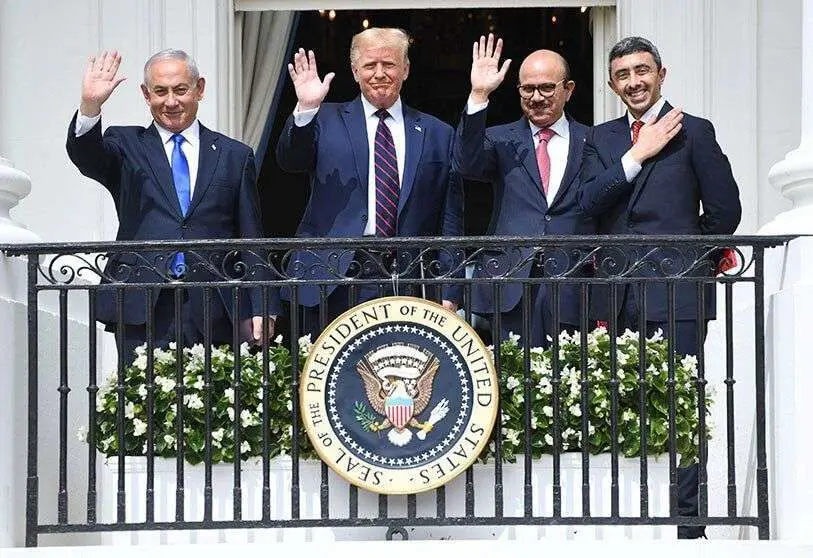... So the impossible occurred

A domino theory, but the other way around. In this case, it is not the first domino that falls which makes all those that follow it collapse. The Abraham Accords, father to both Jews and Arabs, mark just the opposite: the dominoes stand up and a new paradigm emerges in the region, which is famously deserved to be the hottest region on the planet. It is no longer risky to predict that the normalisation of relations between Israel and the United Arab Emirates (UAE) and Bahrain will be followed by similar agreements with other Arab countries-strategic alliances that will erase the stigma of a Jewish state allegedly incompatible and eternally antagonistic to the Muslim neighbours.
The great pomp and circumstance with which the peace agreements were signed on the southern prairie of the White House will radically change the story of Middle Eastern history. Nor is it that the event came out of nowhere as if by magic. Indeed, since the end of the 20th century, not a few informal emissaries from Israel have been weaving secret ties with the Gulf monarchies, including Saudi Arabia, in the fields of defence, trade, culture and technological research. This would explain why the respective public opinions have normally admitted, and even cheered, a ceremony that will mark history.
The main difference between the peace agreements Israel signed with Egypt and Jordan and those now initialled with the UAE and Bahrain is that the former was reached between governments, with important sectors of their respective peoples opposed to what they described as a betrayal. This was the direct cause of the assassination of President Anwar El Sadat. The same accusation was also levelled at the Israeli prime minister, former General Yitzhak Rabin, before he was murdered at close range. On the contrary, neither in the UAE nor in Bahrain have there been any demonstrations against it, nor is there any evidence of trends that abhor cooperation with Israel. Another thing is the drama of the Palestinian people, which has gone from being the spearhead of the Muslim world's desire to wipe Israel off the face of the earth.
Considering the change in paradigm, perhaps it is time that the Palestinians did not continue to miss all the trains. Ever since Yasser Arafat turned back when he could have signed the best possible agreement with Ehud Barak, they have only gone backwards, increasing their direct and indirect dependence on an increasingly powerful Israel.
It is evident that, once relations are normalised, the UAE-Israeli technological collaboration has a common root in defence against whom they regard as the main threat, Shiite theocratic Iran. Given the current circumstances, they will also close ranks in biomedical research in pursuit of solutions to the coronavirus pandemic. And it is obviously more than likely that this technological alliance will revive the Middle East region to the forefront of the most advanced countries. Israel is the country with the most innovation start-ups in the world. Sharing this knowledge in normalised relations with neighbours will make the region a hub that is sure to discuss many primacies with China and the United States.
A few weeks before the US elections, Donald Trump is chalking up an undoubted diplomatic success, shaped by his son-in-law, Jared Kushner, the true architect of the agreements. In Europe, which gives the United States lessons in ethics and so forth, Trump is often considered so ignorant as to not even know the names of the capitals of the countries he has signed agreements with. But he cannot be argued with for the pragmatism of not stumbling over the same stone several times, by ceasing to insist on applying the same failed solutions to old, unresolved problems. He will certainly be no better, intellectually speaking, than his predecessors and many of his European counterparts, but he will have to be recognized for an instinct and a cheekiness with which he makes many old and worn-out glories blush.
As for Benjamin Netanyahu, there is general agreement in Israel that his handling of the pandemic has been a manifest disaster. However, regarding the region's geopolitics, Netanyahul has calibrated the times and actions with the precision of an entomologist. His political opponents and problems with justice may remove him from power sooner than he himself would like, but neither can it be denied that he has been able to contribute to writing the history of the Middle East with unprecedented features of hope.

